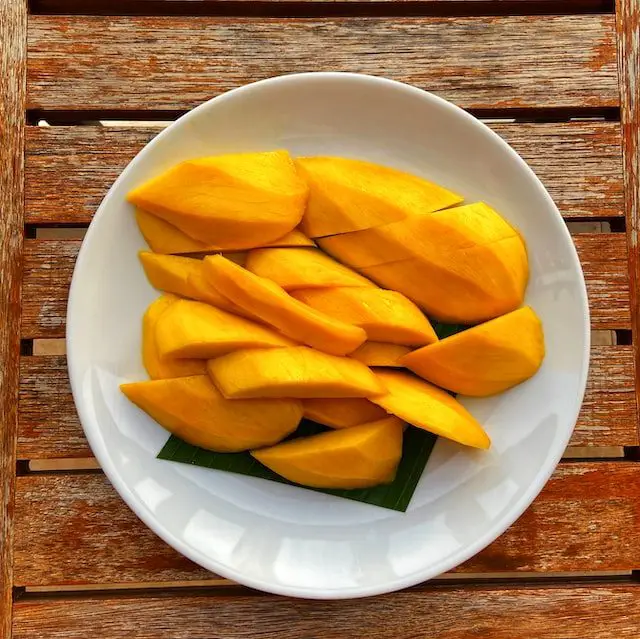Mango is both the name of the sweet tropical fruit and the tree on which it grows.
The ones that are ripe are juicy, meaty, and delectable. Mangoes, like peaches and plums, contain an inedible pit. However, in contrast to these other fruits, mango skin is extremely rough and inedible.
Botanically, mango is a drupe, consisting of an outer skin, an edible fleshy section, and a center stone containing a single seed – also known as stone fruit.

Consuming seasonal fruits has been associated with a reduced risk of several lifestyle-related disorders for quite some time.
According to nutritionists, mango is a fruit that contains lots of health benefits. It is a midsummer delicacy and a nutrient-dense food source.
However, like other things, excessive usage may negate its benefits.
With the advice of a doctor and/or a qualified nutritionist, diabetics can consume fruit, but the amount must be limited as per glycaemic control.
Contents
Mangoes nutritional information
A mango of medium size weighs roughly 200 grams and contains 150 calories, 28 grams of carbohydrates, minimal fat, and minimal protein.
Sucrose, a healthy complex carbohydrate present in mangoes, is a wonderful source of Vitamin A and Vitamin C, both of which are required on a daily basis.

Due to its high fiber, magnesium, iron, and antioxidant content, mango is a cholesterol-free, healthful fruit.
The glycemic index of mangoes ranges from 41 to 60, making them safe to eat in moderation.
Benefits of Mangoes for Health
These are the health advantages of mangoes:
Mango is high in fiber and water content and may improve digestion by minimizing constipation and boosting regularity in the digestive tract.
This famous fruit contains vitamin c and pectin, all of which contribute in lowering serum cholesterol levels, especially Low-Density Lipoprotein (LDL), sometimes known as “bad cholesterol”.
According to scientists, antioxidant and beta-carotene consumption is related to a reduced risk of developing asthma. And mango is an excellent source of beta-carotene.
One medium-sized mango has around 15 milligrams of vitamin K, which promotes calcium absorption and bone health.
A cup of sliced mango contains 25% of the recommended everyday allowance of vitamin A, which enhances eyesight, prevents night blindness, and soothes dry eyes.
They are also rich in polyphenols, which are powerful antioxidants. Mangiferin, which is present in mangoes, is a potent antioxidant.
Antioxidants have anti-aging effects by limiting free radical damage to the body.
Consuming this tropical fruit in moderation is vital for maintaining good skin and hair. Vitamin C in mangoes aids in the treatment and prevention of blocked pores and acne.
They serve as a natural sunscreen by protecting our skin from UV light’ harmful effects. Vitamin A, which is present in mangoes, is also responsible for healthy skin and hair.
Boosts the Immune System
Mangoes’ substantial vitamin C and vitamin A levels maintain a robust immune system.
Their fiber, potassium, and vitamin content protect against cardiovascular disease.
One cup (100 grams) of sliced mango has 168 mg of potassium and 1 mg of sodium, making it heart-healthy.

According to a study conducted by eminent researchers, mangoes and other fruits that are rich in various substances such as quercetin, isoquercitrin, and astragalin may also provide protection against prostate cancer, breast cancer, and leukemia.
These contain several advantages for hair because they contain vitamin A, an essential component for the production of serum that keeps hair moist. Vitamin A is also essential for the growth of skin and hair, among other tissues.
Vitamin C, which a daily intake of mango may provide, is essential for the creation and maintenance of collagen, the structural component of skin and hair.
Do mangoes make you gain weight?
We have spoken at length about how mangoes aid in weight loss, but we must not overlook the fact that they can also lead to weight gain.
Considering that an average size mango has approximately 150 calories, ingesting two mangoes will result in approximately 300 calories.

It is widely taken after meals throughout Asia. Therefore, adding them to your diet will result in an increase in calories without a corresponding decrease elsewhere.
These additional calories may cause weight gain.
Therefore, they are always preferable to midday and evening snacks. Thus, you can indulge in the wonderful flavor of seasonal fruit without worrying about the additional calories.
Low-Calorie Recipes
Mango Smoothie
- Mango is peeled and cut into little pieces.
- Blend the fruit pieces till smooth in a blender.
- Mix in nonfat plain yogurt well. If the mixture is too watery, add additional yogurt and blend.
- Add ice, then serve cold.
- 1 cup of mango smoothie has around 150 calories (without sugar).
Mango Yogurt
- The mangoes are peeled and cut into little pieces.
- Fresh low-fat yogurt is blended until smooth.
- After dicing, they are added and mixed well. Your fruit yogurt is now ready to consume.
- Adding a half teaspoon of sugar to the yogurt at the point of mixing is optional but may be done if desired.
Therefore, the next time you consider devouring delicious mangoes, try these low-calorie dishes without fear of weight gain.
Bottom-Line
Initially, mangoes should not be eaten with the main meal at lunch or dinner. This prevents both weight gain and post-meal glucose increases.
Moreover, it is recommended to consume mangoes as a whole. In this scenario, the fruit can be cut into slices or cubes, but it should not be juiced for ingestion. This results in a loss of fiber and nutrients.
Enjoy this delightful summer delicacy while knowing everything there is to know about mangoes.
